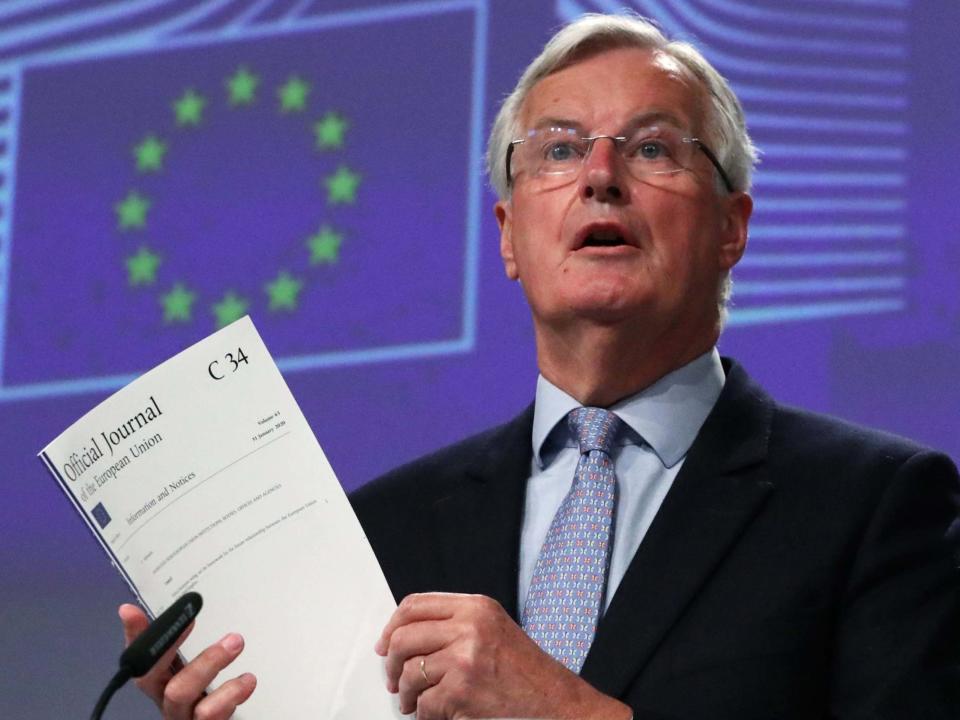Brexit: Michel Barnier says EU ‘cannot go on like this forever’ and accuses Boris Johnson of backtracking on promises

The EU’s chief trade negotiator has accused Boris Johnson of “backtracking” on commitments he made during the Brexit process and cast doubt on the future of talks.
Michel Barnier warned that there had been “no significant progress” on key points in negotiations since they began, adding: “I don’t think we can go on like this forever.”
The intervention comes at the close of the latest round of trade talks held between the two sides – via videoconference on account of the coronavirus pandemic.
But Mr Barnier expressed hope that the next round of negotiations later this month could be done face-to-face, suggesting this might make the situation “better and more effective”.
David Frost, the UK’s own chief negotiator, said in a separate statement that “progress remains limited”, adding: ”If we are to make progress, it is clear that we must intensify and accelerate our work. We are discussing with the Commission how this can best be done.”
Speaking at a press conference at the close of negotiations, Mr Barnier listed four specific points in the Brexit “political declaration” signed by Boris Johnson in January that he said were not being broken.
The areas covered the “level playing field” in regulations, civil nuclear cooperation, anti-money laundering rules, and a commitment about the technical structure of the deal.
“It is not difficult to read – good weekend reading, if I may say,” he quipped. “It will remain for us the only valid reference, the only relevant precedent in this negotiation. That was agreed by both sides. Yet, round after round, our British counterparts seek to distance themselves from this common basis.”
Turning to the wider issues, such as fishing and regulatory standards, blocking a deal, Mr Barnier said: “There has been no significant progress on these points, as I’ve said, not since the start of these negotiations and I don’t think we can go on like this forever.
“On top of this the UK have refused to extend the transition period ... from our side, as indeed was already pointed out ... we have always been open on our side to extending this period by one or two years. It’s possible and written into the agreement.
“However, if there is no joint decision towards such extension, if there is no change, the UK will leave the single market and the customs union on 31 December.
“If we take into account what we have in terms of time to ratify an agreement, we have to have a legal text at the latest 31 October – that leaves us about five months. We have to use this time as efficiently as possible.”
He added: “In all areas the UK continues to backtrack on the commitments it has undertaken in the political declaration, including on fisheries where we agreed to use our best endeavours to ratify an agreement by 1 July 2020. It seems clear that we will not reach the target, considering how the negotiations are going.”
David Frost, the UK’s chief negotiator, said: “We have just completed our fourth full negotiating round with the EU, again by video conference. It was a little shorter than usual and more restricted in scope. We continue to discuss the full range of issues, including the most difficult ones.
“Progress remains limited but our talks have been positive in tone. Negotiations will continue and we remain committed to a successful outcome.
“We are now at an important moment for these talks. We are close to reaching the limits of what we can achieve through the format of remote formal rounds. If we are to make progress, it is clear that we must intensify and accelerate our work. We are discussing with the Commission how this can best be done.
“We need to conclude this negotiation in good time to enable people and businesses to have certainty about the trading terms that will follow the end of the transition period at the end of this year and, if necessary, to allow ratification of any agreements reached.
“For our part we are willing to work hard to see whether, at least, the outline of a balanced agreement, covering all issues, can be reached soon. Any such deal must of course accommodate the reality of the UK’s well-established position on the so-called level playing field, on fisheries, and the other difficult issues.”
One more round of talks is scheduled for this month before a “stock-take”, where Boris Johnson will meet European Commission president Ursula von der Leyen to discuss the overall situation.
“Even if we work more intensively ... we’re going to have to go right up to the line in October,” Mr Barnier said. He called for “extra political momentum” to move the negotiations on.
A senior UK source close to the talks said: “We are not up for a long negotiation over the next months and into the autumn where nobody knows what will happen. October is too late for us to conclude this. We need to work intensively now into July to see if we can find the high-level trade-offs that will unlock a deal.”
Read more
Four ways the Brexit transition period could still be extended
EU Brexit trade demands won’t change to suit UK, Brussels says
Brexit negotiator says he doesn’t answer to Dominic Cummings

